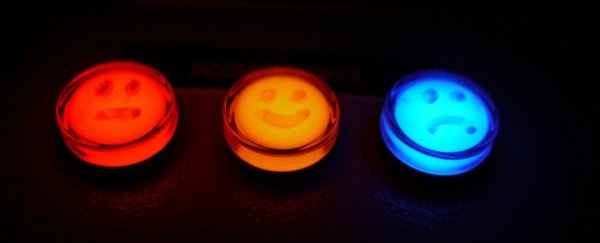The same genetic codes that make us prone to depression could also predispose us to positivity and happiness, according to a new study.
To put it another way, the researchers think the same genes might make us more sensitive to our environment – and depending on environmental conditions, that could be for better or worse.
"If you have those genes and are in a negative environment, you are likely to develop the negative cognitive biases that lead to mental disorders," says cognitive psychologist Elaine Fox from Oxford University in the UK. "If you have those genes but are in a supportive environment, you are likely to develop positive cognitive biases that increase your mental resilience."
The researchers, who reviewed a range of studies for their new paper, now want more of a focus on how the genetics of mental health mix with cognitive biases – the preset mental filters at work in our brains.
"When people have a cognitive bias that emphasises negative aspects or thoughts, they are more at risk of mental health disorders," explains clinical psychologist Chris Beevers from the University of Texas at Austin.
"There is a lot of research about these biases, and a lot of research about genes that may make people susceptible to mental ill health. However, we suggest that it could make more sense to bring together these two areas of research."
By combining work on both genetics and bias, the pair hope to further our understanding of how mental health problems take root – and that in turn could lead to better therapies tailored more specifically to each patient. It could also help identify people at risk of depression earlier.
As the team explains in Molecular Psychiatry, we don't yet know much about the psychological or biological mechanisms that underlie this extra sensitivity to our environment, but it's possible that some genetic variants previously labelled as problematic could actually turn out to be positive (given the right surroundings).
They suggest that certain mental processes could explain the differential susceptibility hypothesis – the idea that in a group of people, some are more likely to react to events in either a positive or negative way, thanks to genetic variation.
The team sifted through dozens of scientific papers on these topics for their own study. Some of them (like this 2006 study) identify links between genes and depression, while others (including this 2010 paper) look at how attention bias affects how we react to events.
The next step, the researchers say, is combine these two fields of study and look at how our mental biases influence certain sets of genes and, combined with day-to-day environmental pressures, tip people one way or the other – into negative or positive feelings, even though the basic genetic coding might be the same.
Some of this work will be carried out through the CogBIAS Project set up by Fox at Oxford University, a multidisciplinary research effort aiming to find out what it is that separates the emotionally resilient from the emotionally vulnerable.
With time, the team says, it might be possible to adjust or retrain certain biases in the brain, and thus limit the depressed or anxious thoughts some people have. It's early days yet, but we're looking forward to seeing where this research leads.
